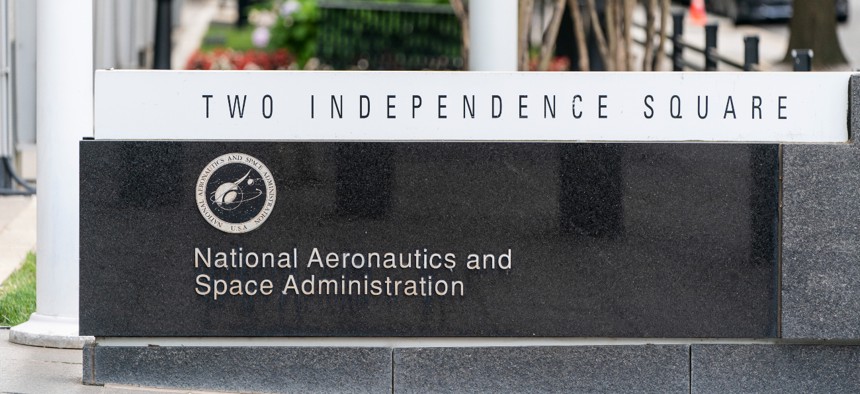
NASA, like other federal agencies, uses annual performance appraisals to determine who gets step increases, performance bonuses and promotions. Joshua Roberts/Getty Images
A 9-Year-Old Case Alleging Discrimination by NASA Can Finally Proceed
An administrative judge last week certified the classes of Black and Asian American employees at the agency, who allege its performance appraisal system discriminates against them, allowing the case to move forward.
A discrimination lawsuit brought by Black and Asian American employees at the National Aeronautics and Space Administration that has languished for nearly a decade may finally move forward, after an administrative judge at the Equal Employment Opportunity Commission said last week it may proceed as a class action case.
In a 17-page opinion, Administrative Judge Stephanie Herrera certified two groups of employees—Black NASA employees and Asian American NASA employees, both within the pay grades of GS-13 and GS-15—as eligible to become classes in the lawsuit.
The claimants in the case allege that flaws in NASA’s Employee Performance Communication System, a performance management system implemented in 2007, have contributed to Black and Asian American employees of the agency consistently and systematically performing worse on annual performance appraisals than their white counterparts.
The case was first filed in 2013, with an application to certify the two classes submitted in 2014, but was effectively in limbo until Herrera took over as judge in 2019. Lawyers representing the claimants attributed at least a portion of the long delay to a backlog of cases at the EEOC and a lack of funding for the agency to hire additional administrative judges.
Michael Lieder, an attorney representing the employees, said the case is based upon data showing that Black and Asian American employees in the upper General Schedule pay grades received lower performance ratings than their white colleagues. They hired experts to analyze the data, and they found potential flaws in the system that allow for racial bias in performance ratings.
“One problem is that the performance appraisal system calls for people typically to be rated on between two to four factors, once a year,” Lieder said. “Now, if you think about your own job, trying to identify and set forth standards that people need to meet in order to perform and be deemed as performing adequately in two to four little statements, that’s going to result in a system that is at a very high level of abstraction that generates assessments that are very highly discretionary. To add to that, we think there’s not adequate training for the people involved—managers and employees—on how to deal with the expectations there be two to four things on which they’re rated, you end up with a system that’s inviting managerial stereotypes into evaluating people.”
NASA, like other federal agencies, uses annual performance appraisals to determine who gets step increases, performance bonuses and promotions.
On Wednesday, a NASA spokesperson stated in an email that agency officials were aware of the decision and that the space agency is "committed to its diversity, equity, inclusion, and accessibility goals and ensuring all agency employees are treated fairly including in how employees are rated and rewarded for their contributions to the nations space program."
Public Affairs Specialist Gerelle Dodson added that they "are very proud that NASA has been rated the #1 place to work in the federal government for 10 straight years. We will continue to prioritize our workforce as our talent is our greatest asset."
Lieder, the attorney representing the employees, said that, unlike in private sector discrimination cases in federal courts, EEOC claimants’ ability to acquire testimony and documents is severely curtailed until an administrative judge certifies the class. In this case, the judge allowed a limited early discovery period for the exchange of written documents, but they thus far have been unable to depose witnesses or obtain all relevant documents.
NASA has 40 days to decide whether to appeal the administrative judge’s ruling to the EEOC Office of Federal Operations. If they let the case move ahead, a more fulsome discovery process will begin.







